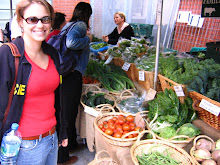 Chickens are a rather important (and at times fairly irritating) part of the social economy here in Moncion. Right now, as I sit in my "office" on the porch of our guesthouse, I am watching the neighbor train his roosters for fighting. This involves a practice fight (traqueo) between his various roosters and consequent selection of a few who are taken away. My guess is that a cock fight is in the works for this evening or weekend. There is a constant din of crowing throughout the town of Moncion, and the sound of it pulses across the valley all day and most of the night. As we inadvertently determined via an interview recording a rooster crows every five seconds in our neighborhood.
Chickens are a rather important (and at times fairly irritating) part of the social economy here in Moncion. Right now, as I sit in my "office" on the porch of our guesthouse, I am watching the neighbor train his roosters for fighting. This involves a practice fight (traqueo) between his various roosters and consequent selection of a few who are taken away. My guess is that a cock fight is in the works for this evening or weekend. There is a constant din of crowing throughout the town of Moncion, and the sound of it pulses across the valley all day and most of the night. As we inadvertently determined via an interview recording a rooster crows every five seconds in our neighborhood.The roosters of Moncion only take time off from crowing between the hours of 7 pm and 3 am, which is now when I sleep. There must be thousands of roosters here, which is an indication of the role cockfighting plays in the entertainment "industry" here. It's a blood "sport" during which roosters often fight to the death (and then are eaten by the crowd), and it has huge social significance for the construction of masculinity here and in the wider Caribbean region.
 But...if you think the roosters have a terrible fate, consider the fates of the hens. The Dominican Republic has adopted much of the North's industrial models of farming, and just up the road there are several chicken houses. Whether they are layers or broilers is not clear, but what is clear from menus and our meals in the guesthouse, is that eggs and chickens are a staple food for Dominicans. What is also clear is that these chickens live short, miserable lives crammed into cages just so we eaters can have cheap food, and those farmers can make money. (Incidentally, livestock farmers have the nicest houses in Moncion).
But...if you think the roosters have a terrible fate, consider the fates of the hens. The Dominican Republic has adopted much of the North's industrial models of farming, and just up the road there are several chicken houses. Whether they are layers or broilers is not clear, but what is clear from menus and our meals in the guesthouse, is that eggs and chickens are a staple food for Dominicans. What is also clear is that these chickens live short, miserable lives crammed into cages just so we eaters can have cheap food, and those farmers can make money. (Incidentally, livestock farmers have the nicest houses in Moncion).After our housemother AnaJulia made Erin and I (industrially produced) eggs for breakfast five days in a row, we began to worry about our health and the impact of our "choice" to eat these eggs. And so we took matters in our own hands. One day, I saw a woman on the beautiful "Road to Moncion" (a book I will write someday) selling small, brown eggs in the shade of a small stand. I am not kidding when I say I slammed on the brakes, almost got us flattened by a truck and backed into a tree just to get me some of those eggs. Turns out the hens are housed in wooden cages, but out in the open air, and they probably live lives a lot like the hens in my own backyard. The hens belong to the "sister of Emelita" and the eggs they produce are for sale along with sweets, cake and casabe most days of the week.

Even though AnaJulia has three sweet hens and a Foghorn Leghorn rooster in her backyard, she still buys the white eggs in the colmados (small local groceries). We weren't sure how she would receive our donation, and haven't explored the issue yet, but I suspect that she thinks we want the industrial products. We have slowly and gently been steering her towards the idea that we actually *like* to eat local fruits and vegetables. (We both have been having green vegetable fantasies...). This seems to mystify her for the most part, but she does her best to please us, no matter how weird our tastes might seem.

While the roosters and the layers of Moncion have uncertain and often horrible fates, the "wild chickens" of Moncion lead lives that most chickens would envy. They are literally everywhere, in all shapes, sizes and colors. They bring back fond memories of my own little Banty chickens, and it makes me happy to see livestock freed from the bonds of human desires for profit, pleasure and captivity.
So to answer the age old question, why did the chicken cross the road? Because, here in Moncion, it could.

No comments:
Post a Comment